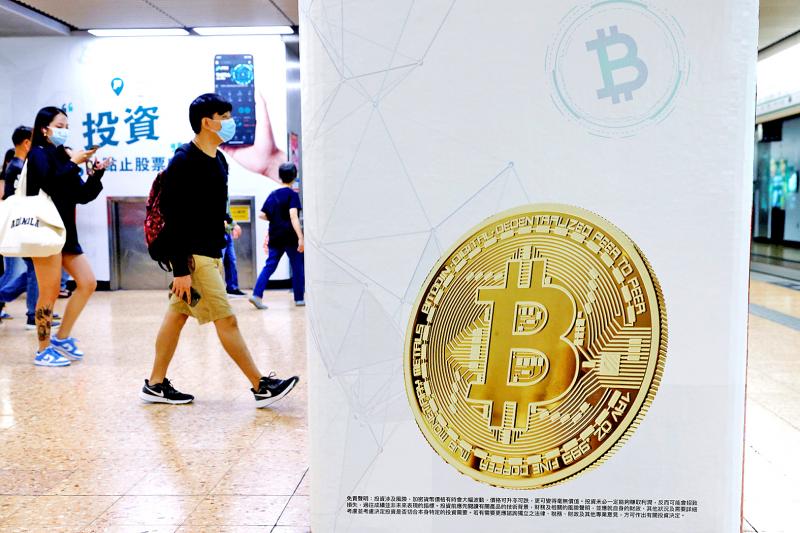Customers of a Hong Kong-based cryptocurrency exchange say they cannot withdraw money or tokens from the bourse, and at least seven have reported the matter to police.
Dozens of clients have been unable to make withdrawals from Coinsuper (幣成) since late November last year, based on a review of messages on the firm’s official Telegram chat.
Five customers said that they had filed police reports after withdrawals were apparently frozen, leaving them unable to retrieve about a combined US$55,000 of tokens and cash.

Photo: Reuters
The uproar around Coinsuper, backed by Pantera Capital, might fuel calls for broader regulatory oversight in Hong Kong.
The head of the territory’s securities watchdog in November 2020 said it would propose a licensing regime for all crypto-trading platforms, an approach rival financial hub Singapore is also pursuing.
Coinsuper executives did not respond to calls and messages seeking comment.
In response to an inquiry about the Coinsuper complaints, a Hong Kong police spokesperson said by e-mail that it is investigating one case where a person who bought cryptocurrency “via an investment company” was unable to withdraw her funds since last month.
In Coinsuper’s Telegram chat, the administrator stopped responding to queries about failed withdrawals in late November, then resurfaced in the past week to ask affected users to provide their e-mail addresses. Some clients said in interviews that there was no follow-up after doing so, and the administrator did not respond to messages from Bloomberg.
Coinsuper’s trading app remains operative, and the exchange handled around US$18.5 million of volume on Friday — down from a daily peak of US$1.3 billion in late 2019, according to crypto data firm Nomics.
Binance (幣安), the biggest crypto exchange, handled about US$51 billion of transactions over the same time period, Nomics data show.
Hong Kong uses a so-called “opt-in” regulatory regime for crypto exchanges, meaning they can apply to be regulated.
Stringent regulations mean it is “not very attractive” for platforms to pursue that route, said Joshua Chu (朱喬華), a consultant at ONC Lawyers (柯伍陳律師事務所) in Hong Kong.
The territory would likely move away from the opt-in model sometime this year, Chu said, adding that it is “not uncommon” for crypto exchanges to face problems including long withdrawal times, highlighting that regulation might be needed for issues that are technical in nature.
According to Chinese media reports, Coinsuper was founded in 2017 by Chinese tycoon Zhang Zhenxin (張振新), who died in 2019.
Karen Chen, who joined Coinsuper as CEO in early 2018 after working as a senior executive at UBS Group AG, said in an interview that she left the company in July 2019 for personal reasons
A partner at one of Coinsuper’s venture capital backers, who asked that he and his firm not be identified, said it has written off its entire about US$1 million investment.
About six to eight months ago, the firm lost contact with Coinsuper’s management and Chen stopped responding on WeChat, the person said.
Several employees left the company between July and last month, data from Hong Kong’s Companies Registry showed.
Pantera Capital, run by veteran Bitcoin investor Dan Morehead, did not return e-mails seeking comment. The firm invested in Coinsuper in its June 2018 Series A funding round. Pantera’s Web site still lists the crypto exchange among its investments.

SEMICONDUCTORS: The German laser and plasma generator company will expand its local services as its specialized offerings support Taiwan’s semiconductor industries Trumpf SE + Co KG, a global leader in supplying laser technology and plasma generators used in chip production, is expanding its investments in Taiwan in an effort to deeply integrate into the global semiconductor supply chain in the pursuit of growth. The company, headquartered in Ditzingen, Germany, has invested significantly in a newly inaugurated regional technical center for plasma generators in Taoyuan, its latest expansion in Taiwan after being engaged in various industries for more than 25 years. The center, the first of its kind Trumpf built outside Germany, aims to serve customers from Taiwan, Japan, Southeast Asia and South Korea,

Gasoline and diesel prices at domestic fuel stations are to fall NT$0.2 per liter this week, down for a second consecutive week, CPC Corp, Taiwan (台灣中油) and Formosa Petrochemical Corp (台塑石化) announced yesterday. Effective today, gasoline prices at CPC and Formosa stations are to drop to NT$26.4, NT$27.9 and NT$29.9 per liter for 92, 95 and 98-octane unleaded gasoline respectively, the companies said in separate statements. The price of premium diesel is to fall to NT$24.8 per liter at CPC stations and NT$24.6 at Formosa pumps, they said. The price adjustments came even as international crude oil prices rose last week, as traders

Taiwan Semiconductor Manufacturing Co (TSMC, 台積電), which supplies advanced chips to Nvidia Corp and Apple Inc, yesterday reported NT$1.046 trillion (US$33.1 billion) in revenue for last quarter, driven by constantly strong demand for artificial intelligence (AI) chips, falling in the upper end of its forecast. Based on TSMC’s financial guidance, revenue would expand about 22 percent sequentially to the range from US$32.2 billion to US$33.4 billion during the final quarter of 2024, it told investors in October last year. Last year in total, revenue jumped 31.61 percent to NT$3.81 trillion, compared with NT$2.89 trillion generated in the year before, according to

SIZE MATTERS: TSMC started phasing out 8-inch wafer production last year, while Samsung is more aggressively retiring 8-inch capacity, TrendForce said Chipmakers are expected to raise prices of 8-inch wafers by up to 20 percent this year on concern over supply constraints as major contract chipmakers Taiwan Semiconductor Manufacturing Co (TSMC, 台積電) and Samsung Electronics Co gradually retire less advanced wafer capacity, TrendForce Corp (集邦科技) said yesterday. It is the first significant across-the-board price hike since a global semiconductor correction in 2023, the Taipei-based market researcher said in a report. Global 8-inch wafer capacity slid 0.3 percent year-on-year last year, although 8-inch wafer prices still hovered at relatively stable levels throughout the year, TrendForce said. The downward trend is expected to continue this year,